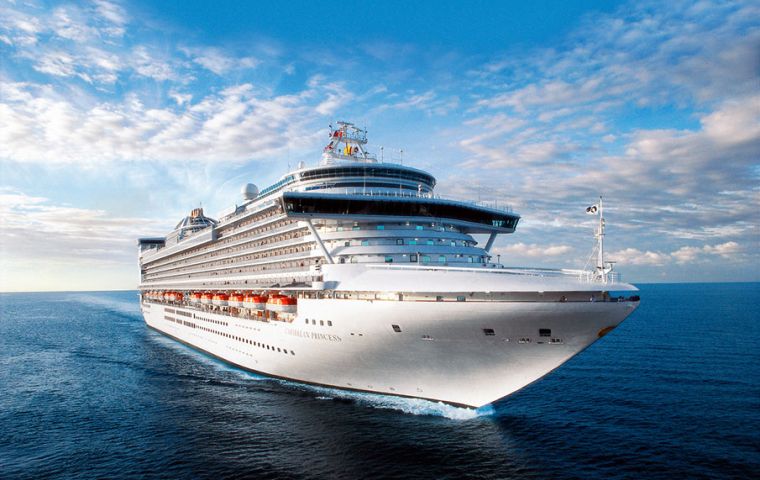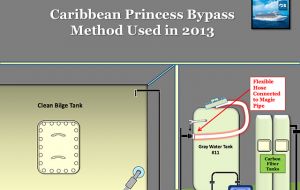MercoPress. South Atlantic News Agency
Major cruise line fined US$ 40 million for deliberate vessel pollution
 The sentence imposed on Princess Cruise Lines by US District Judge Patricia Seitz is for illegally dumping oil-contaminated waste overboard and falsifying official logs
The sentence imposed on Princess Cruise Lines by US District Judge Patricia Seitz is for illegally dumping oil-contaminated waste overboard and falsifying official logs  Judge Seitz ordered US$1 million be awarded to a UK engineer, who first reported the illegal discharges to the British Maritime and Coastguard Agency (MCA)
Judge Seitz ordered US$1 million be awarded to a UK engineer, who first reported the illegal discharges to the British Maritime and Coastguard Agency (MCA)  The engineer on the Caribbean Princess reported that a so-called “magic pipe” had been used 2013, to illegally discharge oily waste off the coast of England
The engineer on the Caribbean Princess reported that a so-called “magic pipe” had been used 2013, to illegally discharge oily waste off the coast of England A major cruise line with ships that call on the Caribbean will have to pay a US$40 million penalty, the largest-ever for crimes involving deliberate vessel pollution. The sentence has been imposed on Princess Cruise Lines Ltd by US District Judge Patricia Seitz in Miami, for illegally dumping oil-contaminated waste overboard and falsifying official logs to conceal the discharges.
Judge Seitz also ordered that US$1 million be awarded to a British engineer, who first reported the illegal discharges to the British Maritime and Coastguard Agency (MCA), which in turn provided the evidence to the US Coast Guard. The newly hired engineer on the Caribbean Princess reported that a so-called “magic pipe” had been used on August 23, 2013, to illegally discharge oily waste off the coast of England without the use of required pollution prevention equipment.
The evidence gathered by the whistleblower, including photographs of the magic pipe, led to an inspection of the cruise ship both in England and then when it reached New York on September 14, 2013. During each of the separate inspections certain crew members concealed the illegal activity by lying to the authorities in accordance with orders they had received from Caribbean Princess engineering officers.
The sentence imposed by Judge Seitz also requires that Princess remain on probation for a period of five years during which time all of the related Carnival cruise ship companies trading in the US will be required to implement an environmental compliance plan that includes independent audits by an outside company and oversight by a court appointed monitor.
As a result of the government’s investigation, Princess has already taken various corrective actions, including upgrading the oily water separators and oil content monitors on every ship in its fleet and instituting many new policies.
According to papers filed in court, the Caribbean Princess had been making illegal discharges through bypass equipment since 2005, one year after the ship began operations. The August 2013 discharge approximately 23 miles off the coast of England involved approximately 4,227 gallons within the country’s Exclusive Economic Zone.
At the same time as the discharge, engineers ran clean seawater through the ship’s monitoring equipment in order to conceal the criminal conduct and create a false digital record for a legitimate discharge.
The case against Princess included illegal practices which were found to have taken place on five Princess ships – Caribbean Princess, Star Princess, Grand Princess, Coral Princess and Golden Princess.
One practice was to open a salt water valve when bilge waste was being processed by the oily water separator and oil content monitor. The purpose was to prevent the oil content monitor from going into alarm mode and stopping the overboard discharge. This was done routinely on the Caribbean Princess in 2012 and 2013. The second practice involved discharges of oily bilge water originating from the overflow of gray water tanks into the machinery space bilges. This waste was pumped back into the graywater system rather than being processed as oily bilge waste, and then pumped overboard anytime the ship was more than four nautical miles from land. As a result, discharges within US waters were likely. None of the discharges were recorded in the oil record books that are required to be maintained on board the ships.
The papers filed in court revealed that Princess admitted that after suspecting that the authorities had been informed, senior ship engineers dismantled the bypass pipe and instructed crew members to lie. The cruise line also admitted that following the MCA’s inquiry, the chief engineer held a sham meeting in the engine control room to pretend to look into the allegations while holding up a sign stating: “LA is listening.”
The engineers present understood that anything said might be heard by those at the company’s headquarters in Los Angeles, California, because the engine control room contained a recording device intended to monitor conversations in the event of an incident.
A perceived motive for the crimes was financial – the chief engineer that ordered the dumping off the coast of England told subordinate engineers that it cost too much to properly offload the waste in port and that the shore-side superintendent who he reported to would not want to pay the expense.
Of the US$40 million penalty, US$10 million is earmarked for community service projects to benefit the maritime environment; US$3 million of the community service payments will go to environmental projects in South Florida; US$1 million will go for projects to benefit the marine environment in United Kingdom waters. Additionally, US$1 million of the criminal penalty will be deposited in the Abandon Seafarer’s Fund, a fund established to provide a mechanism for the US Coast Guard to offer humanitarian relief and support of seafarers who are abandoned in the United States and are witnesses to maritime-related crimes.




Top Comments
Disclaimer & comment rulesCommenting for this story is now closed.
If you have a Facebook account, become a fan and comment on our Facebook Page!